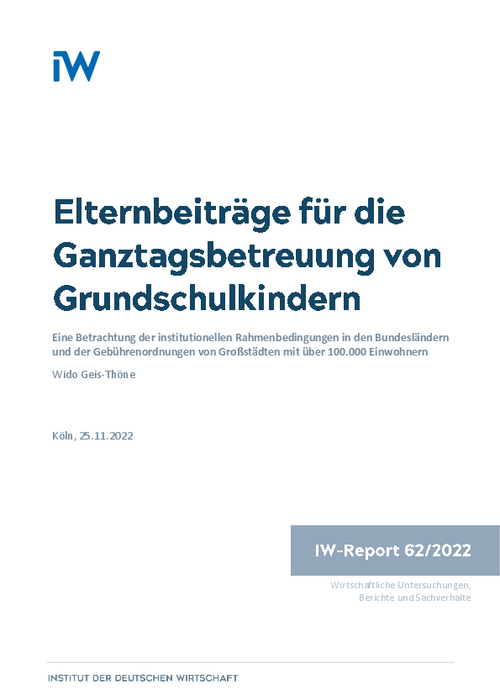The organisation of all-day care for primary school children varies greatly from region to region in Germany. In most of the eastern German states it takes place mainly in after-school care centres, which are part of the child and youth welfare services, whereas in North Rhine-Westphalia these functions are taken over by the open all-day schools.

Parental contributions for all-day care for primary school children

The organisation of all-day care for primary school children varies greatly from region to region in Germany. In most of the eastern German states it takes place mainly in after-school care centres, which are part of the child and youth welfare services, whereas in North Rhine-Westphalia these functions are taken over by the open all-day schools.
In some western German states, such as Hesse, there are even several different types of childcare infrastructure for primary school children at the same time. The overall childcare situation also varies greatly. Hamburg and the eastern German states have enough places to be able to offer all-day care for all primary school children, whereas there are still large gaps in Schleswig-Holstein, Bavaria and Baden-Württemberg. In addition, parents in Hamburg have a legal entitlement at the state level to care for their primary school-age children five days a week from 6:00 a.m. to 6:00 p.m. and the after-school care centres in the eastern German states generally offer long opening hours. In contrast, all-day schools in Schleswig-Holstein only have to be open for at least seven hours on three days a week, and the education act of Lower Saxony specifies a maximum of eight hours a day instead of a minimum. Here, as in some other western German states, it will also be necessary to adjust the opening hours of the childcare infrastructures in order to meet the future legal entitlement to eight hours of childcare per day.
If we look at the financial burden of all-day care on families, Mecklenburg-Western Pomerania stands out with its complete exemption from fees and relatively long hours of provision. This is also the case in Berlin, but only for the first two grades. In North Rhine-Westphalia, on the other hand, substantial parental fees are charged in some cases for attendance at open all-day schools. In Mönchengladbach, for example, the fee rate for a gross income of 50,000 euros is 195.00 euros per month. In some cases, such as the flexible afternoon care and the after-school care centres in Baden-Württemberg, the decision on the level of parental contributions lies with the providers of the care services, so that even within a municipality there is no uniform picture. Moreover, in some states, different rules apply to the various childcare arrangements. In Bavaria, for example, all-day schools are free of charge, whereas fees are charged for the attendance at after-school care centres, which are quantitatively almost equivalent. This represents a substantial unequal treatment, which is only unproblematic if families can freely choose between the different alternatives. This is often not the case due to a still too low overall offer. Against this background, as well as in view of the potential importance of afternoon activities for the social inclusion of many primary school children, it would generally make sense to make at least a core time free of charge. Hamburg can serve as an example. Here, this is the case for the time between 8:00 a.m. and 4:00 p.m., whereas income-related fees are charged for the times earlier in the morning, later in the afternoon and the holidays.

Parental contributions for all-day care for primary school children

More on the topic

The Regional Distribution of Graduates in Germany
Graduates in Germany are distributed very unevenly across the country. Taking the population aged between 35 and 44, who have generally already completed their higher education, in 2019 the highest proportions of university graduates were to be found in Berlin ...
IW
The Regional Distribution of Low-skilled Workers in Germany
Low-skilled workers in Germany are heavily concentrated in urban areas. In 2019, the proportion of 25- to 64-year-olds who had not completed at least two years of vocational training or higher education was almost twice as high in cities with a population of ...
IW